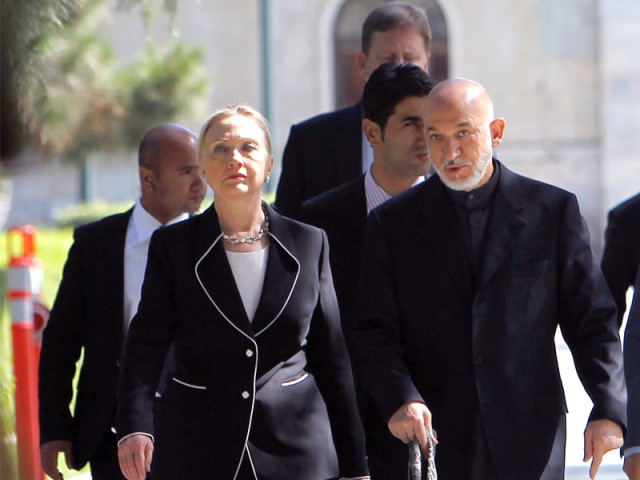Afghanistan beyond 2014: Key donors’ huddle begins in Tokyo today
Japanese minister says donors to pledge over $16b for Afghanistan; US designates Kabul as a major non-Nato ally.

Afghanistan beyond 2014: Key donors’ huddle begins in Tokyo today
Donors at the development conference for Afghanistan will pledge a total of more than $16 billion in aid for four years to 2015, Japanese Foreign Minister Koichiro Gemba said on Saturday.
Japan, the co-chair at a one-day conference for Afghanistan on Sunday, will provide up to $3 billion for the five years to 2016, in addition to $1 billion for the war-torn nation’s neighbouring states, he said.
The assistance pledge of more than $16 billion will include part of the aid to be declared by Japan.
“This scale of pledge will satisfy the fiscal gap that the World Bank and the Afghan government have said would be needed for the development of the country,” he said.
Afghan President Hamid Karzai, who will be in Tokyo along with US Secretary of State Hillary Clinton and United Nations chief Ban Ki-moon, has called for $4 billion a year in civilian aid.
“Japan should contribute to making a systematic framework which will cover the so-called ‘Transformation Decade’ after 2015,” Gemba said.
US-led foreign troops are expected to withdraw from Afghanistan by 2014 despite a surge in Taliban violence in the country which has reeling from a deadly insurgency for the last 10 years.
Speaking in Tokyo, Afghan Finance Minister Dr Umar Zakhwal said that free and transparent elections were necessary to ensure the situation in Afghanistan does not deteriorate further.
“Key institutions in Kabul will have to develop themselves significantly to cope with challenges,” he said at an event on the sidelines of the Tokyo conference.
A representative of the Afghan civil society, Dr Berry Islam said bad governance and corruption had marred social and economic governance. “Counter efforts will remain futile unless backed by the world at large.”
After more than 30 years of war, the Afghan economy is weak and the country cannot survive without foreign aid.
According to the World Bank, spending on defence and development by donors accounted for more than 95 per cent of GDP in 2010-11.
Without a functioning economy, Kabul covers only $2 billion of the $6 billion it spends each year not counting security costs, said a Western diplomat, with donor countries making up the difference.
A principle of ‘mutual accountability’ will be stressed at the more than 70-nation meeting, making continued payment of aid conditional on Kabul making progress, particularly on transparency.
Ministers from Britain, France and Australia, as well as India, Pakistan and Iran, will also be present alongside envoys from countries including Russia, Saudi Arabia, Qatar, China and South Korea.
Meanwhile in Kabul, US Secretary of State Hillary Clinton said her country had designated Afghanistan a major non-Nato ally, giving the war-torn country special privileges.
Clinton announced the move, which provides a long-term framework for security and defence cooperation, during a brief visit to Kabul where she had a breakfast meeting with Karzai.
“We see this as a powerful symbol of our commitment to Afghanistan’s future,” Clinton told a news conference after talks in Kabul with Karzai.
Tens of billions of dollars have poured into Afghanistan since the US-led invasion that toppled the Taliban in late 2001, but graft is rife from local police to high officials, and patience among donor countries is wearing thin. (With additional input from agencies)
Published in The Express Tribune, July 8th, 2012.



















COMMENTS
Comments are moderated and generally will be posted if they are on-topic and not abusive.
For more information, please see our Comments FAQ